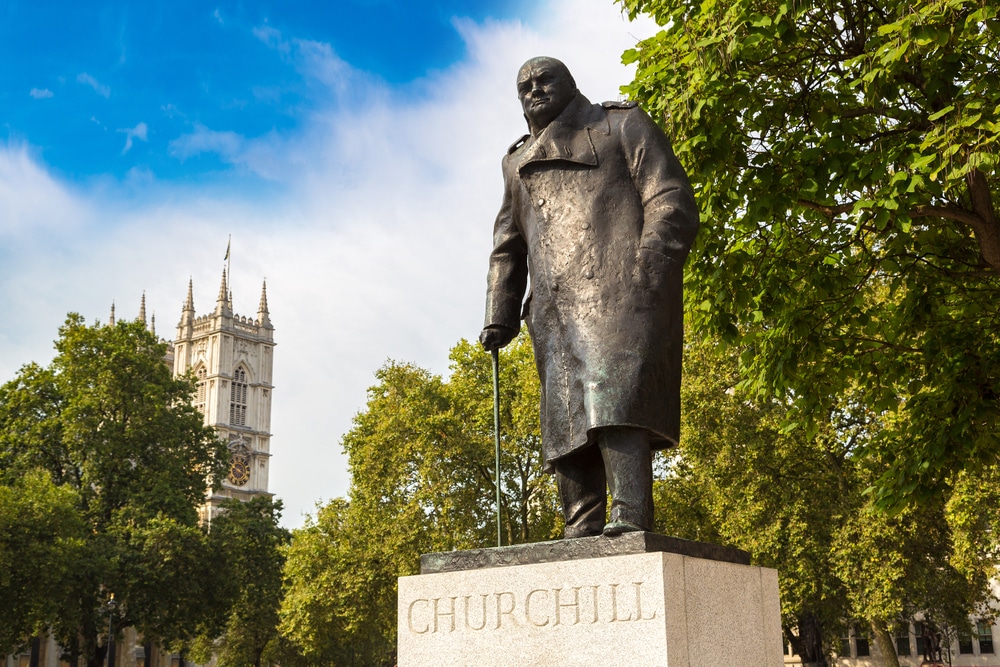Popular historian Darryl Cooper was a guest on the Tucker Carlson Show on September 2 and the podcast caused an eruption of backlash on the internet. Cooper and Carlson discussed several topics, but the one that drew the most hostility was their willingness to criticize Winston Churchill. Cooper even described him as the “chief villain of the Second World War.”
The anger directed at this statement seemed to come from all sides of the political spectrum and judging the conversation by its online reaction would put you under the impression that the podcasters spent the entire two hours portraying the Nazi regime as a sympathetic underdog unfairly maligned by historians. Of course, nothing like that happened.
Cooper specifically said he does not view Adolf Hitler and the Nazis as the good guys, but many political commentators ignored this clarification. They became singularly focused on Cooper’s condemnation of Churchill. To many conservatives, liberals, and establishment-minded pundits, the idea that Churchill could be not just a villain, but the “chief villain” of World War II is tantamount to heresy.
This dogmatic view of Churchill and Hitler is one of many examples of humanity’s desire for a simple binary. Hitler was an evil mass-murdering psychopath which means his opponent, Churchill, must have been the heroic savior of the West. To the binary thinker, even the slightest whisper of criticism aimed at Churchill tips the story on its head. If Churchill was an antagonist, then Hitler must have been the protagonist. There are only two roles in the story, hero and villain. Churchill must be one, and Hitler must be the other.
The problem is that people with a simplistic view of history will inevitably end up rationalizing actions they would otherwise find abhorrent. The hero needed to defeat the villain so any means he used to accomplish that goal must have been necessary. Never mind that Churchill ordered the war’s first intentional area bombing of civilians on his second day as prime minister. Evil must be defeated at any price. To question Churchill’s methods is to become a Hitler apologist.
And so, upon hearing Cooper’s blasphemy, or merely hearing of his blasphemy, critics flooded the internet with outrage. Many of the reactions were cartoonishly simplistic. A post created by more than one person presented a picture of Churchill titled “Good guy” and a picture of Hitler titled “Bad guy” which does not exactly disprove the notion that they are looking at the world through a binary lens.
I am not here to conclusively argue either side of the Churchill debate. I admit I am inclined to be intensely suspicious of any wartime world leader, but the point of this article is not to determine if Churchill was a heroic or villainous figure. I want to raise the question I see few, if any, of the now-triggered Churchill fans asking. Why are so many people willing to entertain the idea that Churchill is the “chief villain” of World War II?
Darryl Cooper’s podcast saw a surge of popularity after his appearance on the Tucker Carlson Show. Clearly, there is a not insignificant number of people who find his views interesting. If it is self-evident that Churchill was the hero of the West, why are people willing to consider rejecting that telling of history? This, to me, is the key question and many political commentators appear completely uninterested in it. They would rather dismiss these ideas as “something dark and twisted” within conservatism or describe Cooper and Carlson as “the statue topplers of the right.” I find these attempts to marginalize Cooper’s views unsatisfactory. If characterizing Churchill as a villain is truly as inaccurate and dangerous as these commentators say, it should be of paramount importance to understand and counter this framing of history.
So, why are so many people open to viewing “the man who saved civilization” as World War II’s villain?
For those listening carefully, Carlson explained his reason for revisiting Churchill’s legacy. He is distressed by how the myth of World War II has been used to justify modern foreign policy. Since too many establishment pundits refuse to take a clearheaded account of American foreign policy, it is unsurprising that this statement from Carlon was overlooked. But for decades world leaders have been selling wars as morality plays in the image of “The Good War.” Every opponent is a new Hitler who must be overthrown.
In 1990, Prime Minister Margaret Thatcher of the United Kingdom said Iraqi President Saddam Hussein was “behaving like Hitler.”
In 2017, White House Press Secretary Sean Spicer compared Syrian President Bashar al-Assad to Hitler. When Secretary of State Rex Tillerson was asked if this rhetoric was productive, he justified the comparison by responding, “…the characterization is one that President Assad has brought upon himself.”
If world leaders see their opponents in the role of Hitler the villain, then they see themselves in the role of Churchill the hero. And surely, it would have been disastrous if Churchill had negotiated with Hitler. Just as in 1940, the one and only answer must be more war.
But being a nation that spends decades at war has consequences. People will want to know what it was all for. Trillions of dollars and hundreds of thousands of deaths, and for what? Constant war is certainly profitable if you are an arms dealer, but a citizen whose money was stolen to pay for weapons that ended up in the hands of the Taliban might start to think these wars have been for nothing. Given the results of the wars in Afghanistan, Iraq, Syria, Libya, and Yemen, perhaps it would have been better for those countries and our own nation if we had not intervened at all.
Of course, there are no perfect solutions. There would still have been suffering and death in the world if the United States had adopted noninterventionism, but then at least the blood and suffering would not have been paid for by our tax dollars.
This leaves us with two statements about U.S. interventionism:
- It has been rationalized using the idea that we cannot allow another Hitler to rise to power.
- It is reasonable to say it has had a destructive effect on the world.
The natural next step is to wonder if the world would have been better off if the West had avoided war with Germany, Italy, and Japan. I cannot look into the past and predict how different actions would have changed the present, but after seeing the consequences of constant warfare, I am certainly open to the possibility that Western interventionism contributed to the disastrous lead-up to the Second World War.
In this context, considering that Winston Churchill might have been a villain of history does not make someone an antisemitic fascist. It is a predictable reaction to the memory of World War II being consistently used as a cudgel to ostracize and silence antiwar voices. If you repeatedly use your heroes to propagandize citizens into supporting needless wars, then you associate your heroes with the dire consequences of those wars. It will only be a matter of time until people begin to question whether your heroes were so great in the first place.
































